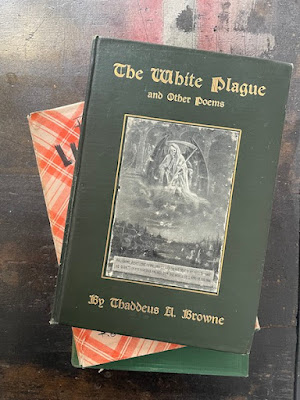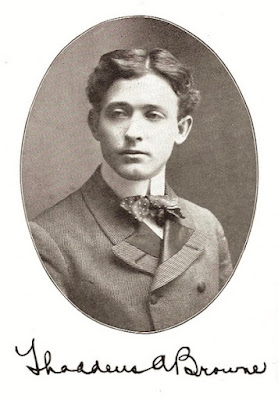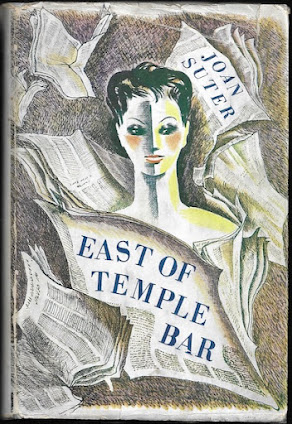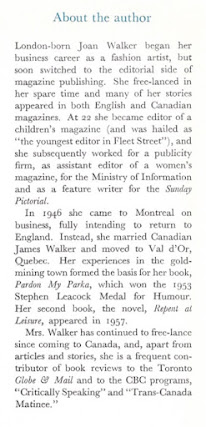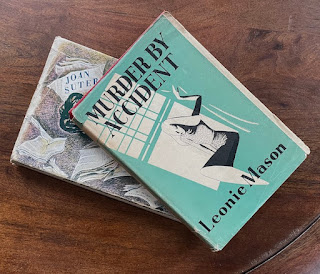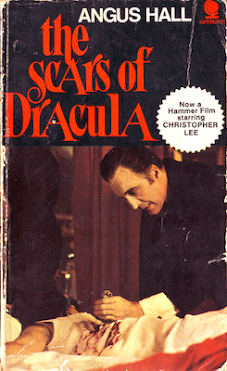Moonbeams from the Larger Lunacy
Stephen Leacock
Toronto: Gundy, 1915
282 pages
My introduction to Stephen Leacock came through a copy of Laugh With Leacock belonging to my father. A squat mass market paperback, it sat on peach crate shelving in our basement. As a child, I was drawn to its cartoon cover.
No pun intended.
 |
Montreal: Pocket Books, 1946
First published by Dodd, Mead in 1930 |
The scene depicted comes from "The Hallucination of Mr. Butt," which in turn comes from "Afternoon Adventures in My Club," which first appeared in book form in Moonbeams from the Larger Lunacy, which I read for the first time last week.
Made me laugh.
"The Hallucination of Mr. Butt" is one of seven tales the narrator tells of fellow club members. Butt (his first name is never disclosed) sees himself as a most generous and self-sacrificing person, ever ready to assist others. In the episode covered, he's setting out to help the Everleigh Joneses:
“Isn’t it rather late to go there?” I protested. “My dear fellow,” said Mr. Butt warmly,
“I don’t mind that a bit. The way I look at it
is, here are these two young people, only married a few weeks, just moving into their new
house, everything probably upside down, no
one there but themselves, no one to cheer them
up,”—he was wriggling into his raincoat as
he spoke and working himself into a frenzy of
benevolence,—“good gracious, I only learned
at dinner time that they had come to town, or
I’d have been out there days ago,—days
ago-”
The night is cold, and rainy, and dark, but after knocking on several doors – "‘Do you know where the Everleigh
Joneses live?’ They didn’t. ‘All right,’ I said,
‘go back to bed. Don’t bother to come down.’" – Butt succeeds in finding the newlyweds' house. At the club the next day, Butt shares what followed:
"Hullo," I called out; "it’s
Butt." "I’m awfully sorry," he said, "we’ve gone
to bed." "My dear boy," I called back, "don’t
apologize at all. Throw me down the key
and I’ll wait while you dress. I don’t mind
a bit."
"Just think of it," continued Mr. Butt,
“those two poor souls going to bed at half past ten, through sheer dullness! By George, I
was glad I’d come." ‘Now then,’ I said to myself, ‘let’s cheer them up a little, let’s make
things a little brighter here.’"
Butt visits the Everleigh Joneses on a near-daily basis, rolling up his sleeves to help them settle in – "got the
pictures up first—they’d been trying to put
them up by themselves in the morning. I had
to take down every one of them—not a single
one right." Ultimately dissatisfied, he has them move to a downtown flat – "I like an
apartment far better than a house" – when tragedy strikes:
“'He’s ill—some sort of fever—poor chap—
been ill three days, and they never told me or
sent for me—just like their grit—meant to
fight it out alone. I’m going out there at
once.” From day to day I had reports from Mr.
Butt of the progress of Jones’s illness.
“I sit with him every day,” he said. “Poor
chap,—he was very bad yesterday for a while,
—mind wandered—quite delirious—I could
hear him from the next room—seemed to think
some one was hunting him—‘Is that damn old
fool gone,’ I heard him say.
“I went in and soothed him. ‘There is no
one here, my dear boy,’ I said, ‘no one, only
Butt.’ He turned over and groaned.
That's not the end of Everleigh Jones, nor is it the conclusion of the story. Much as I like "The Hallucination of Mr. Butt," it is far from the best in Moonbeams from the Larger Lunacy; it isn't even the best of "Afternoon Adventures in My Club." That distinction belongs to "The Spiritual Outlook of Mr. Doomer," whose titular character is first depicted looking gloomily out the club library's windows. He is a man saddened by, as he puts it, "the sense of the irrevocability of death and the changes that must come after it.” “You think of these things a great deal, Mr. Doomer?” the narrator asks.
“I do,” he answered. “It may be that it is something in my temperament, I suppose one would call it a sort of spiritual mindedness. But I think of it all constantly. Often as I stand here beside the window and see these cars go by”— he indicated a passing street car —“I cannot but realise that the time will come when I am no longer a managing director and wonder whether they will keep on trying to hold the dividend down by improving the rolling stock or will declare profits to inflate the securities. These mysteries beyond the grave fascinate me, sir. Death is a mysterious thing.”
"The Hallucination of Mr. Butt" is the only story from Moonbeams from the Larger Lunacy to feature in Laugh With Leacock, which according to the back cover of my father's copy is "the cream of Stephen Leacock's humor [sic]." It is also the only story to make it into The Leacock Roundabout, Laugh With Leacock's successor.
 |
| New York: Dodd, Mead, 1956 |
What I've coming to realise is that my taste in Leacock is markedly different than those of the anthologists. As the covers of Laugh With Leacock and The Leacock Roundabout suggest, the stories contained provide good-natured laughs; black humour has no place.
I've worked as an anthologist myself, so understand the constraints, one of which is length. Moonbeams from the Larger Lunacy begins with "Spoof."
At twenty-four pages, it's by far the longest piece. It appealed to me not only for the passages of Spoof Leacock provides, but as a satire of publisher marketing:
This novel represents the last word in up-to-date fiction. It is well known that the modern novel has got far beyond the point of mere
story-telling. The childish attempt to interest
the reader has long since been abandoned by
all the best writers. They refuse to do it.
The modern novel must convey a message, or
else it must paint a picture, or remove a veil, or open a new chapter in human psychology.
Otherwise it is no good. SPOOF does all of
these things. The reader rises from its perusal
perplexed, troubled, and yet so filled with information that rising itself is a difficulty.
Moonbeams from the Larger Lunacy was a gathering of fairly recent magazine pieces and previously unpublished work intended to capitalise on the Christmas market. And, because it was the 1915 offering, the Great War intrudes for the first time: "The War Mania of Mr Jinks and Mr Blinks," "Last Man Out of Europe," "Sidelights on the Supermen," and "In the Good Time After the War." The last, which also happened to be the final piece in the collection, imagines the post-war as a time of great cooperation, in which political differences are non-existent. It is the weakest piece, while "Last Man Out of Europe," ranks amongst the very best. Here, Parkins, yet another member of the gentleman's club tells of the days of horror he and travelling companion Loo Jones suffered in trying to leave the continent. In Hungary when war was declared, the pair made for the nearest railway station:
“They said they’d
sell us tickets. But they questioned us mighty
closely; asked where we wanted to go to, what
class we meant to travel by, how much luggage
we had to register and so on.”
They reach Genoa only to find that it is three days until the next steamer to New York:
"Stuck it out as best we could: stayed right there in the hotel. Poor Jones was pretty well collapsed! Couldn't do anything but sleep, and eat, and sit in the piazza of the hotel."
Cutting, but not dark; it stands in such contrast with Leacock's later writing about the Great War. In our own darkening days, I recommend "The Boy Who Came Back" from
The Hohenzollerns in America (Toronto: Gundy, 1919).
An unfocussed post, I know, but then this book, like so many Leacocks is a bit of a grab bag. "Our Literary Bureau" made me laugh out loud; "Weejee the Pet Dog" is, I hope, the worst thing I'll read by the man.
My point is that there is so much more to Leacock than Sunshine Sketches of a Little Town and anthology servings. Seek out the long out-of-print volumes. As with any writer, the most popular isn't necessarily the best.
Object: A nicely-proportioned hardcover, very typical of its time. My first Canadian edition was purchased three decades ago at the annual McGill Book Fair (held in Redpath Hall, mere metres away from the university's Leacock Building). Price: $1.00. At the end of the volume is found three pages of advertisements for the author's other books: Arcadian Adventures with the Idle Rich, Behind the Beyond, Nonsense Novels, Literary Lapses, and Sunshine Sketches of a Little Town. These are followed by an advert for The International Studio magazine.
Sadly, but unsurprisingly – it was published in 1915, after all – my copy lacks its dust jacket (above).
Should I have expected more for a dollar?
It once belonged to a G.R. England. Going through the 949 Englands in the 1921 census, I find Gordon England (age 19), Gaspard England (age 21), George England (age 51). Gosselin England (age 71)... and that's just Quebec.
Access: Moonbeams from the Larger Lunacy enjoyed several Canadian, British, and American editions before going out of print in the 'twenties. It returned in 1964 as #46 in the New Canadian Library, and remained in print well into the 'eighties. I once purchased a copy with the third series design at Eaton's in downtown Montreal, not 100 meters from the university at which Leacock taught.
Used copies of are both plentiful and inexpensive. If you've got the cash, the one to buy is offered at US$150 by a Milton, Ontario bookseller. It has the dust jacket.
